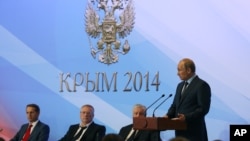Russian President Vladimir Putin said on Thursday his country would stand up for itself but not at the cost of confrontation with the outside world, a seemingly conciliatory note after months of tough rhetoric over the crisis in Ukraine.
Putin spoke Thursday in Yalta during the final day of a two-day visit to Crimea, the Ukrainian region Russia annexed in March.
He was addressing an assembly largely comprised of Russian ministers and members of parliament traveling with him.
The tone of Putin's comments was seen as low-key and he avoided the kind of barbs he has previously directed at Western countries during the crisis, which has dragged East-West relations to their lowest ebb since the Cold War.
“We must calmly, with dignity and effectively, build up our country, not fence it off from the outside world,” he said. “We need to consolidate and mobilize but not for war or any kind of confrontation ... for hard work in the name of Russia.”
In additional comments, Putin said Russia should aim to sell its oil and gas for roubles globally because the dollar monopoly in energy trade was damaging Russia's economy.
And, he said that he had signed off on establishing a Russian military force in Crimea but said the presence would not be too heavy or costly.
Crimea as symbol for Russia
Ukraine has denounced Putin's visit to Crimea, refusing to recognize Moscow's takeover of the strategic Black Sea peninsula of nearly two million mostly Russian-speaking inhabitants.
Dismissing Ukraine's protests, Putin said Crimea should become a symbol of a powerful and unified new Russian state.
Speaking of the crisis in eastern Ukraine, he said that Russia "will do everything that depends on us to make sure that the (Ukraine) conflict ends as soon as possible."
However, he did not spell out how Russia intended to help.
Kyiv has accused Russia of fueling the separatist rebellion in Ukraine’s east as part of efforts to destabilize the country for its pro-Western course.
National interests
On Thursday, Putin explained his thoughts about Russia's foreign policy doctrine, saying it should be peace-loving.
“All our partners in the world should understand that Russia, like any other large, powerful sovereign state, has various ways and means of ensuring its national interests, and these include armed forces,” he said.
“But this is not a panacea and we do not intend, like some people, to dash around the world with a razor blade and wave that blade around. But everyone should understand that we also have such things in our arsenal," Putin added.
Many of Putin's critics in Western capitals say he has made dovish comments before, but that they are not been matched by actions on the ground.
European countries and the United States allege that Russia is supplying arms to separatists in eastern Ukraine. They have also said a Russian aid convoy headed to Ukraine could be a cover for a military attack.
Moscow has denied such allegations, saying it is only interested in protecting the largely Russian-speaking population in eastern Ukraine.
US commander visits Poland
The commander of U.S. ground forces in Europe arrived in Poland Thursday for talks on boosting the United States' military presence in a country where the crises in neighboring Ukraine crisis has increased concern over Russia’s ambitions in the region.
It was not clear whether the visit of General Donald M. Campbell, was focused on Poland's military cooperation with NATO or bilateral agreements with the United States.
Poland’s foreign minister, Radoslaw Sikorski, told Reuters in an interview Wednesday that NATO member states were close to agreeing steps to beef up the alliance's military presence in eastern Europe.
Poland is currently hosting 350 U.S. soldiers, seven helicopters and two Hercules transport aircraft, which are on exercises in the country, a spokesman for the Polish military said. About twelve F-16 fighter jets are due to arrive in the coming days.
NATO chief Anders Fogh Rasmussen has separately called for a “pre-positioning of equipment and supplies [in Poland] in order to be able to receive rapid reinforcements if needed.”
He also said NATO should look into strengthening its regional headquarters in Poland.
Some information for this report provided by Reuters and AFP.





